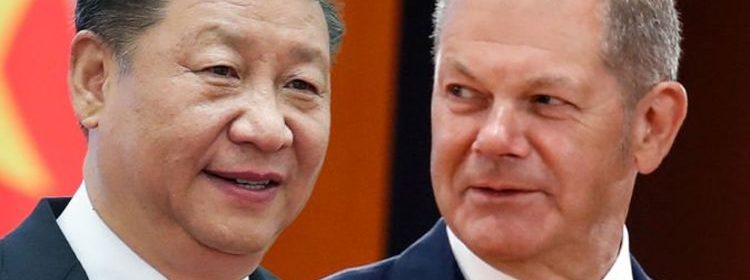China finds ally in Germany following ‘below radar’ meeting: ‘Let’s work together’

Berlin ‘facing dilemma’ over China reveals expert
We use your sign-up to provide content in ways you’ve consented to and to improve our understanding of you. This may include adverts from us and 3rd parties based on our understanding. You can unsubscribe at any time. More info
Chinese Premier Li Keqiang is said to have this week telephoned the new German Chancellor Olaf Scholz pledging his country’s readiness to work with Germany for a steady and long-term development in relations. Mr Li, according to Chinese state media, compared China and Germany, noting that they are both major economies and “responsible countries in the world, as well as supporters of multilateralism and practitioners of free trade”, adding that their cooperation benefits the interests of the world as a whole. This year marks the 50th anniversary of the establishment of German and Chinese diplomatic ties, with China believed to be keen on marking this date with further renewed bilateral relations.
The political bond between China and Germany has vastly improved in recent decades and, despite staunch opposition within Europe, appears to be strengthening.
While many German politicians have called for a shedding of reliance on China, it is difficult given that China remains the biggest market for many European firms, including a number based in Germany.
According to The German Marshall Fund’s (GMF) Watching China in Europe, a think tank, in the months after Germany elected Mr Scholz and a new government in September, Chinese delegates were among the first to offer their congratulations.
In a blog post analysing Beijing’s recent approach to Germany, the GMF wrote: “It started with a handful of discreet post-election meetings between Angela Merkel and senior European decision-makers, including her successor Olaf Scholz, in which the outgoing Chancellor conveyed her concerns about a tougher line.


“It continued in late November with a below-the-radar visit from a group of Chinese officials with deep ties to Germany.
“Led by former ambassador Shi Mingde, they spent over a week in Berlin, Munich, and Stuttgart meeting with Germany’s political and corporate elite — including people close to Scholz.”
Crucial, the GMF said, was the message that these Chinese delegates had for German officials: “Let’s work together to ensure that the special relationship between Berlin and Beijing does not go off the rails.”
In the wake of Mr Scholz becoming Chancellor, President Xi Jinping quickly hailed the “great importance” of his country’s bilateral relationship with Berlin.
JUST IN: Activist armed with ‘crock of s**t’ placard slammed as ‘idiot’ by Tory

The statement urged Mr Scholz to continue the so-called “win-win” approach favoured by his predecessor, Mrs Merkel.
This style of diplomacy has reaped huge dividends for German businesses such as Volkswagen, BMW and chemical giant BASF.
Through trade with these companies, and others, China has soon become Germany’s biggest trading partner with €213bn (£179bn) worth of annual imports and exports.
In recent months, a public campaign to forge closer ties with China from the leaders of these companies got well underway.
DON’T MISS
‘He got us out of cesspit EU!’ Britons back Boris despite opposition [REPORT]
BBC bias row spectacularly backfires against broadcaster [INSIGHT]
Sturgeon bolsters her Indy war chest! Nicola rakes in £700m [ANALYSIS]


Volkswagen’s CEO Herbert Diess took to LinkedIn shortly before Christmas to warn that any push by Germany or Europe to decouple from China would be “very damaging”.
He wrote: “We need more cooperation and presence in China, not less!”
Roland Busch, the CEO of Siemens, added his voice to the conversation, telling Süddeutsche Zeitung that China deserves respect and that banning the import of products from the Xinjiang region — where the Uighur Muslims are currently facing what has been described as genocide — would endanger Germany’s green transition.
Critics say that Germany’s relationship with China, if continued in its current form, is little more than a policy of “Germany first”, turning a blind eye to Beijing’s human rights abuses, as well as its concerning actions in Hong Kong and rhetoric around Taiwan.

Mr Scholz has vowed to “strike out a new path” in Germany, but many say he seems determined to walk the same tightrope as Mrs Merkel when it comes to foreign policy and trade.
Even before his election victory, the Socialist Democratic Party (SPD) politician privately reassured President Xi there would be no major changes to relations with the communist regime in Beijing, according to a report in German media.
And, following a virtual summit with the Chinese leader before Christmas, Mr Scholz called for deeper economic ties and the revival of the controversial EU-China investment deal “as soon as possible”.
The deal, pushed through with the overwhelming support and help of Mrs Merkel, would have put European companies on an equal footing in China and cemented the country’s status as a trusted trading partner.

But it was put on ice after claims China is committing genocide against Uighur Muslims in Xinjiang.
Beijing hit back against EU sanctions by targeting politicians, think tanks and diplomatic bodies in Brussels with sanctions of its own.
China has since called any claims of genocide “absurd”.
Experts argue that Mr Scholz’s embrace of the deal risks sparking a row with his newly formed government, and could isolate Berlin from the rest of Europe.
Source: Read Full Article
